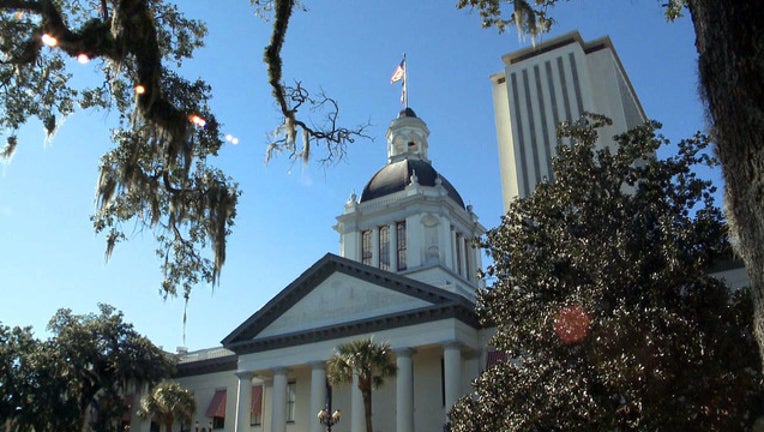DeSantis keeps state budget on hold

TALLAHASSEE, Fla. - Florida’s next budget remains on hold pending another round of federal stimulus money, which could also dictate how state lawmakers readdress the spending plan.
Gov. Ron DeSantis said Monday he has put off formally accepting and reviewing a $93.2 billion budget for the 2020-2021 fiscal year that was approved by the Legislature in March and is slated to take effect July 1.
DeSantis said he is awaiting action from Washington, D.C. on another stimulus package to address the national economic slowdown caused by the coronavirus pandemic. Along with needing to sign the budget before July 1, DeSantis has line-item veto power.
“Once I get a sense of what's going to happen in D.C., which they are going to do something I think for states this week, then I'll have to look at the budget and make those decisions at that time,” DeSantis said while addressing reporters at Lee Health Gulf Coast Medical Center in Fort Myers.
The budget (SB 5001) is one of 190 bills approved by the Legislature during the 2020 session that had not reached DeSantis’ desk as of Monday afternoon.
“It wouldn't have been appropriate for me to have signed a budget knowing that we’re going to have these uncharted waters,” DeSantis said. “But it's also now that we're in uncharted waters, I should see what all my tools are to deal with it. And I do think that you're going to see an effort on the part of the federal government to help with some of these states.”
DeSantis added that while the state’s fiscal outlook was healthy prior to the economic slowdown, federal dollars will be vital to the state’s recovery.
“Hopefully, we'll be able to figure out where we're going to go,” DeSantis said. “I don't think we're going to need to do a special session for the rest of this fiscal year. But I think obviously looking at next year's budget, (it’s) really going to be determined on what you know what we're looking at in terms of economic recovery, but then also what type of federal assistance that we get.”
The current fiscal year ends June 30, and legislative leaders have indicated the state has enough cash to avoid making any budget changes before then.
U.S. House Democrats have pushed forward with another stimulus package that would help states and cities. But during an appearance Sunday on CNN’s “State of the Union,” White House economic adviser Kevin Hassett called the Democrats’ proposal “premature.”
“We've got a bunch of economies around the country and around the world starting to turn the lights back on,” Hassett said. “[We’re] watching to see what happens to economic activity and the path of the disease.”
U.S. Senate Majority Leader Mitch McConnell, R-Ky., has requested the focus first be on money that has already been allocated.
Still, DeSantis isn’t the first Republican state leader to anticipate that federal dollars will help avoid making major budget cuts next year.
In April, state Senate President Bill Galvano, R-Bradenton, pointed to an estimated $12 billion that will come to Florida from the already-approved stimulus package known as the CARES Act. He said the package is expected to provide about $8.3 billion for state and local budget “stabilization,” with $4.6 billion of that amount going to the state. He said another $3.7 billion is expected to be available for specific state programs.
The state, however, also is facing costs because of the pandemic. The state Division of Emergency Management, for example, has spent at least $500 million buying personal protective equipment and undertaking other measures tied to COVID-19, the disease caused by the coronavirus.
A new projection by the Florida Agency for Health Care Administrations says current-year Medicaid costs could require an additional $66 million in state revenue and potentially an additional $1 billion next year.
The 2020-2021 budget was built on tax estimates that relied heavily on industries such as tourism, which has taken a massive hit because of the coronavirus.
The Orlando Sentinel reported last week that a Florida Department of Revenue preliminary estimate of sales-tax collections showed revenue at least $770 million below estimates for March, about 25 percent less than expected for the month.
Meanwhile, Democrats unsuccessfully sought last week to call lawmakers back to Tallahassee for a special session on unemployment, Medicaid expansion and elections. But Democrats were unable to gather enough bipartisan support to spur a special session.
“We are not shocked by this outcome,” Rep. Evan Jenne, D-Dania Beach, said in a statement last week. “There are millions of Floridians whose lives have been thrown into chaos by this pandemic. Right now, it’s hard to make the case that government is doing everything it can to help them. We proposed three ideas that would have provided real relief and safety to working families, but unfortunately our colleagues didn’t think they were worthy of consideration.”
--- News Service staff writer Christine Sexton contributed to this report.

